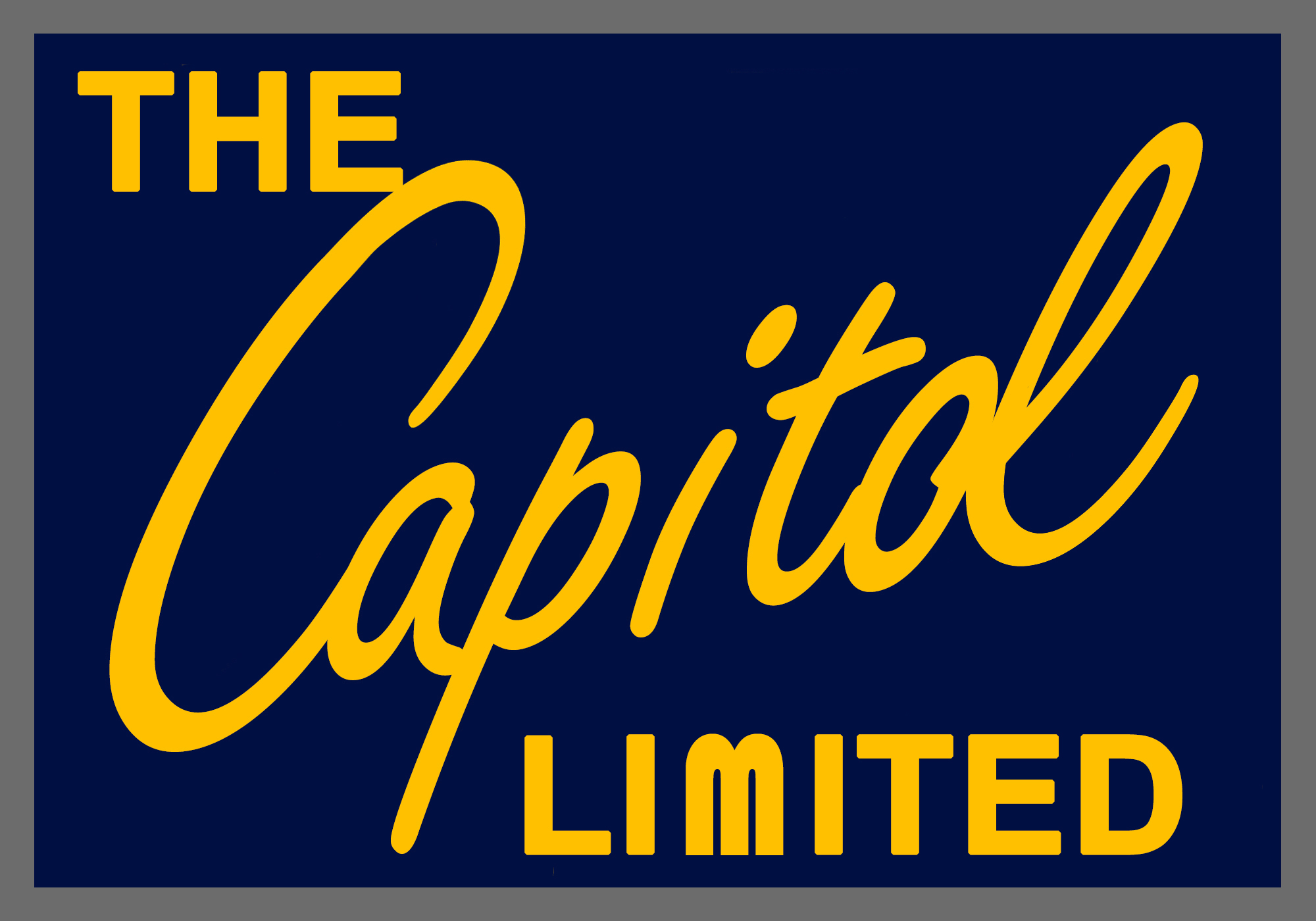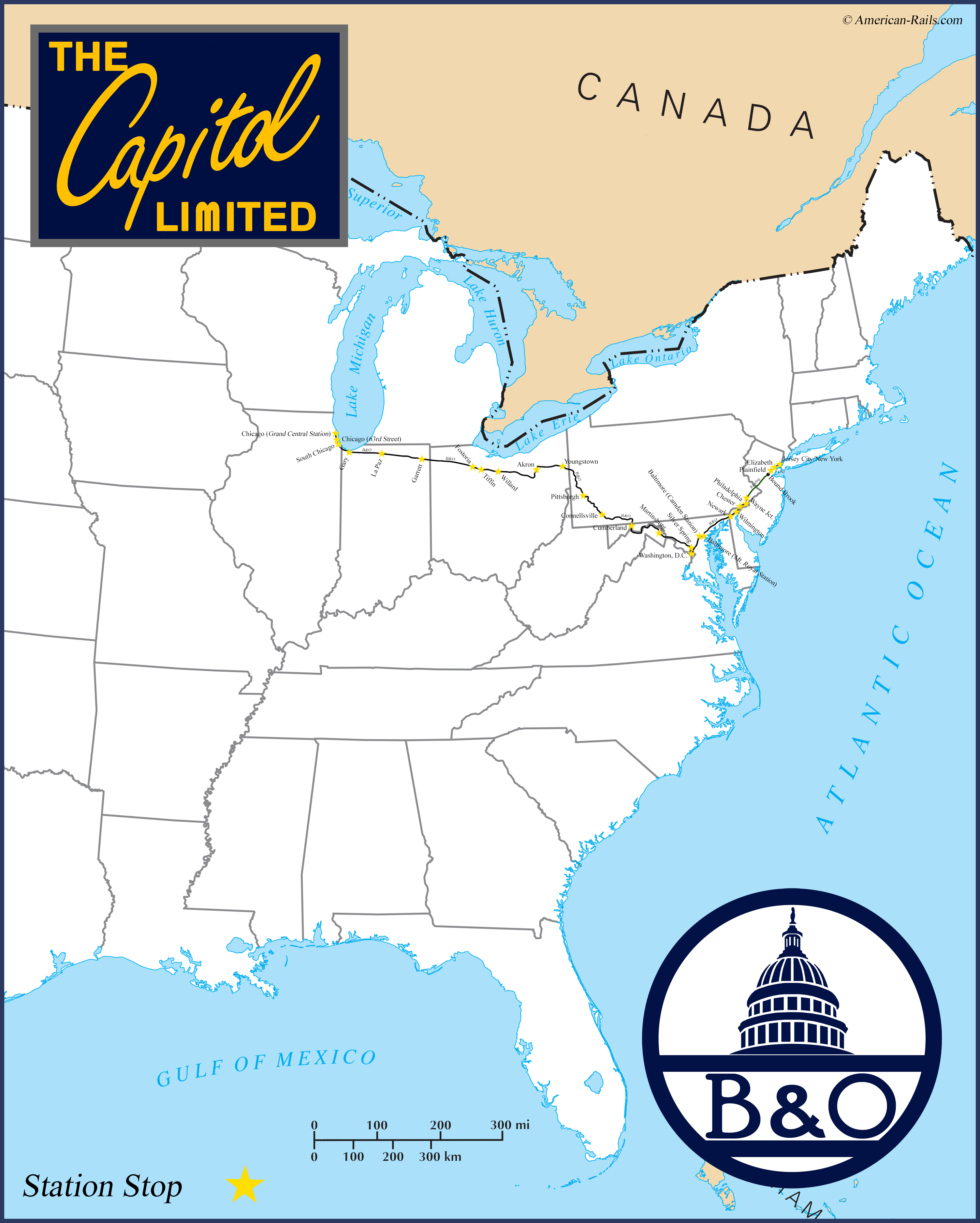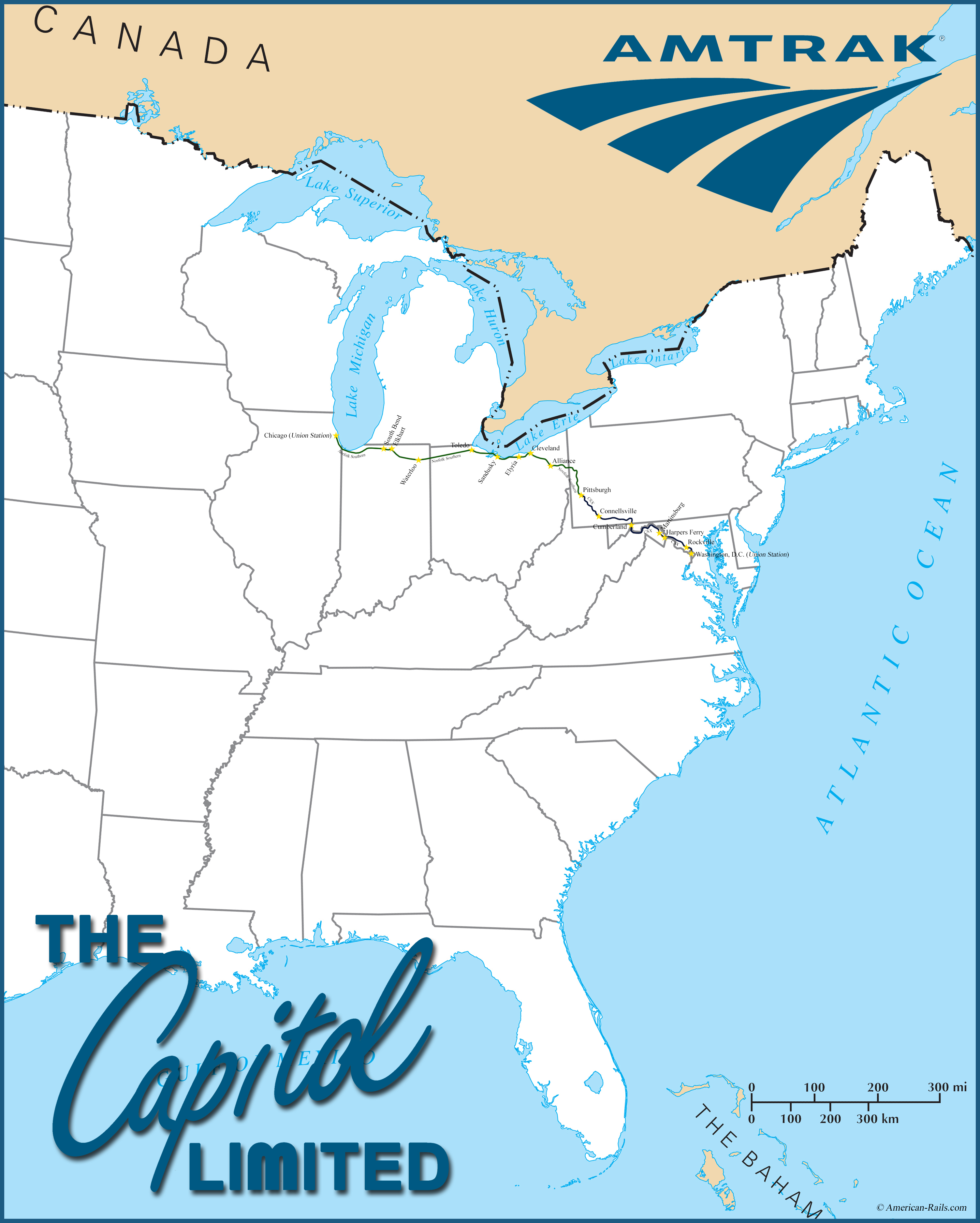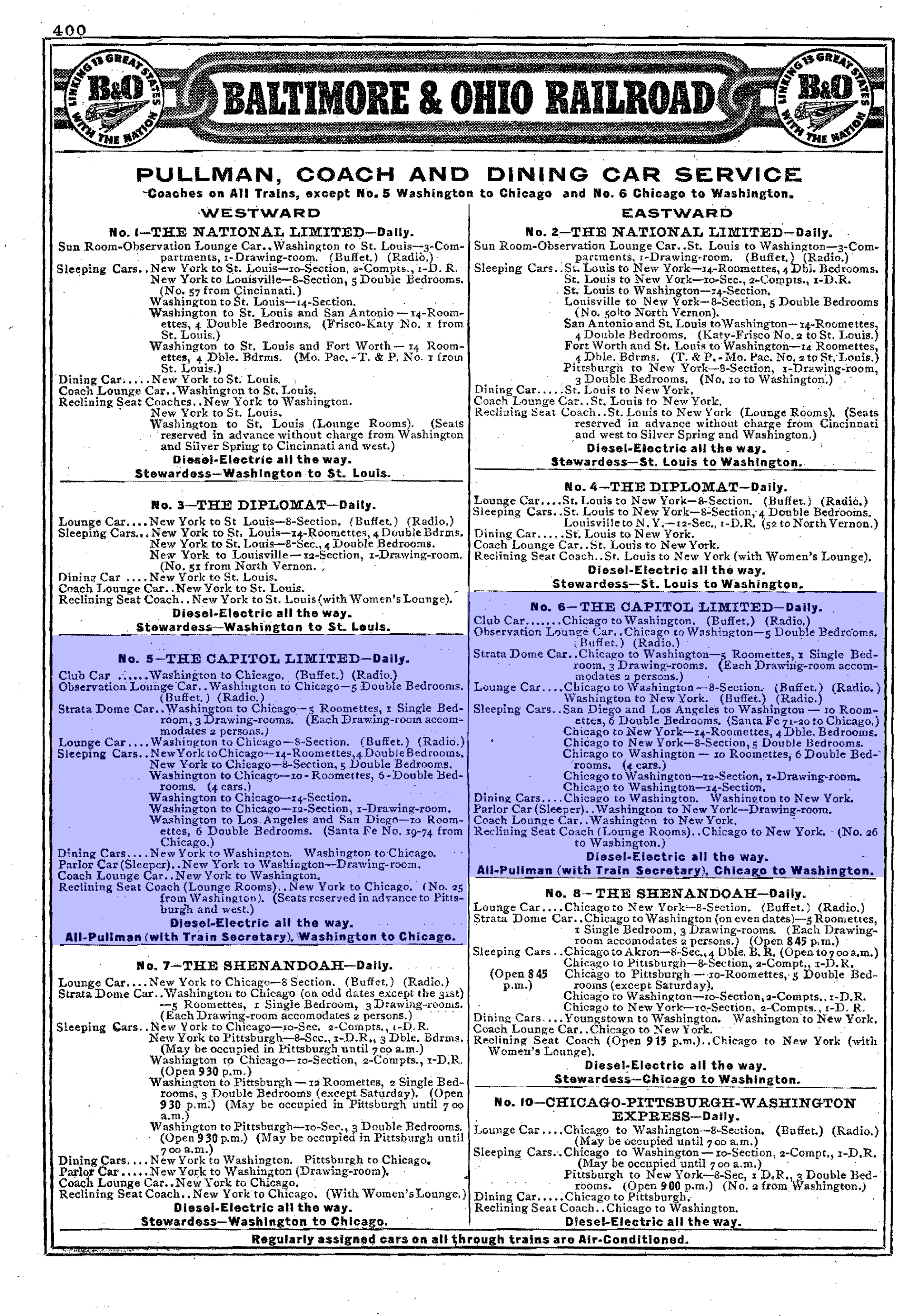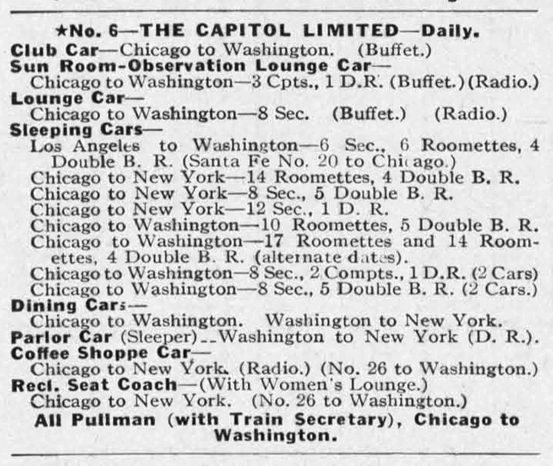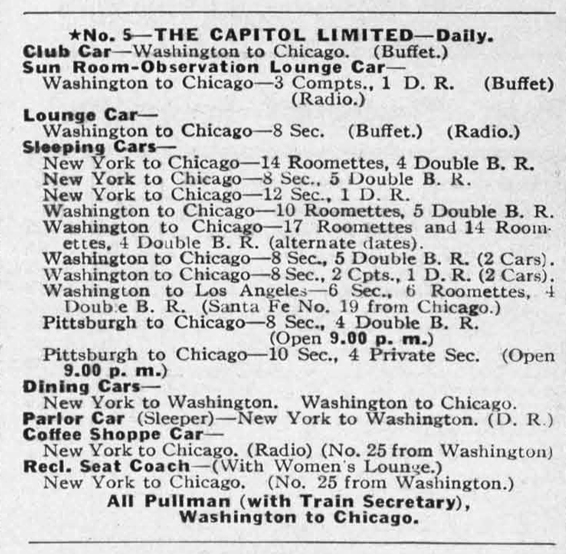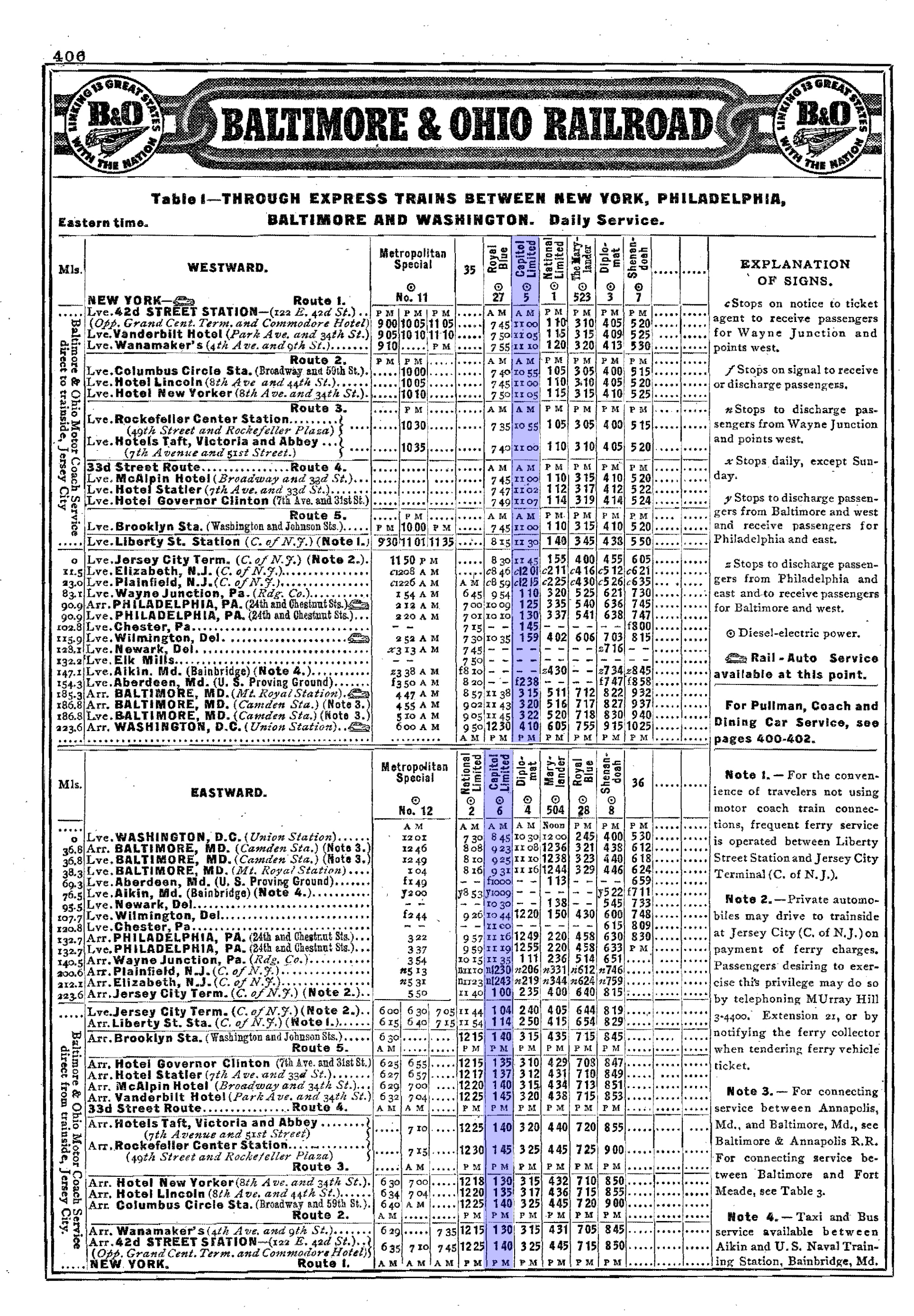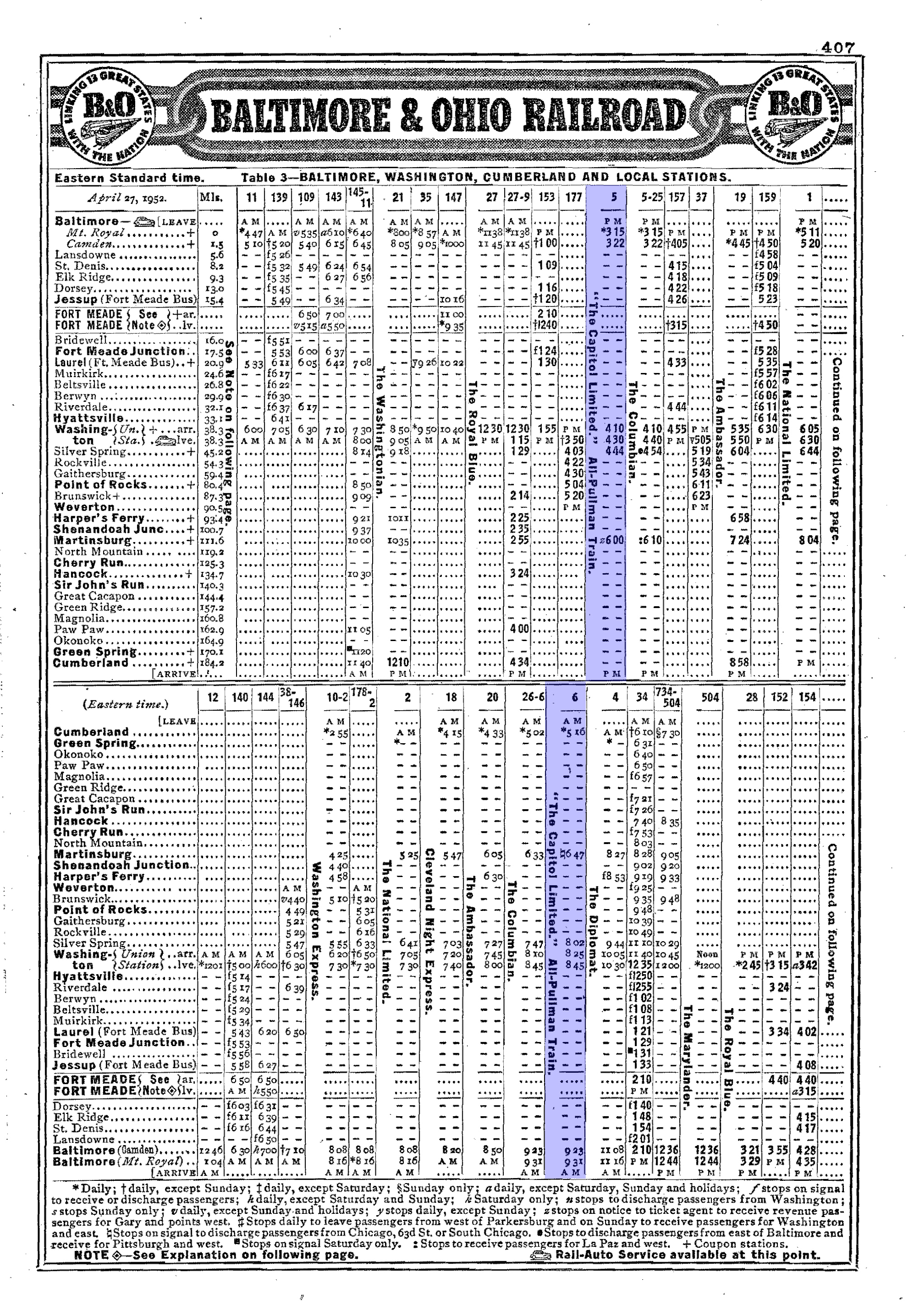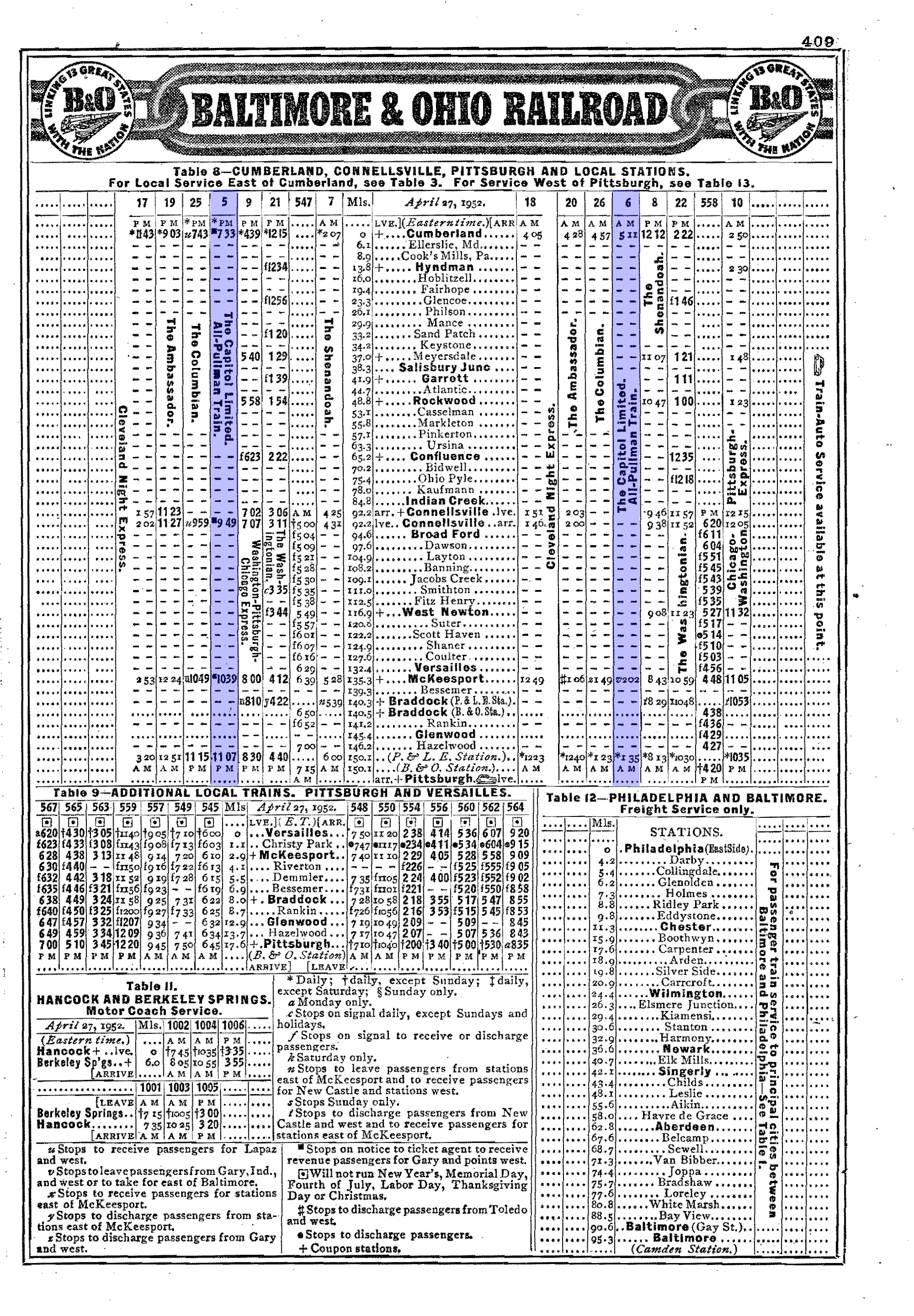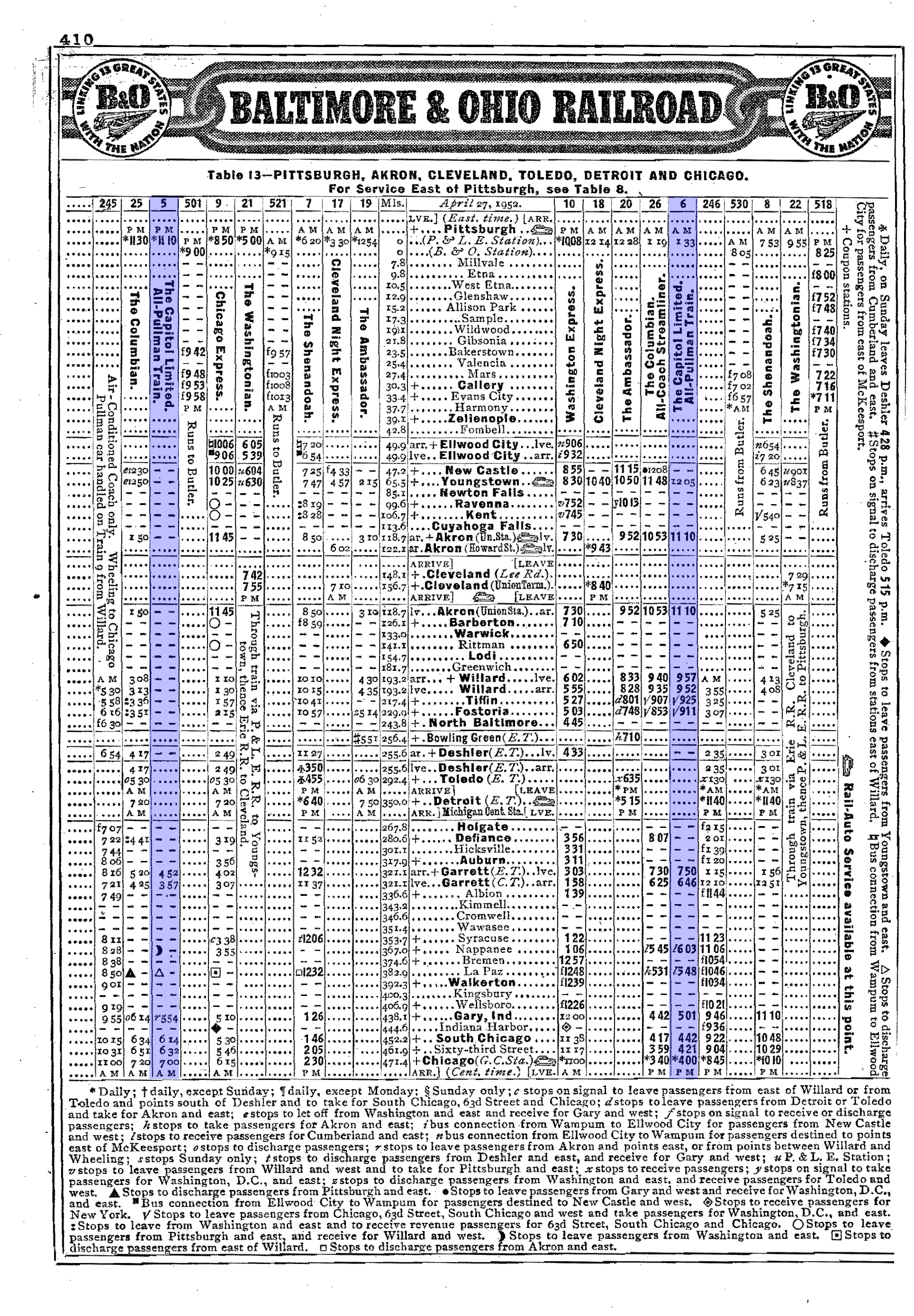"Capitol Limited" (Train): Schedule, Route, Consist, History
Last revised: February 28, 2025
By: Adam Burns
The Baltimore & Ohio’s premier New York-Chicago passenger train, the
Capitol Limited, was born as much out of necessity as anything else.
Ever the underdog in the New York-Chicago market, the B&O knew it needed to keep pace against its two stronger competitors and introduce a train that would strongly rival both the 20th Century Limited and Broadway Limited.
History
While the PRR and NYC had inaugurated their trains in 1902 (the Penny's train, however, was not called the Broadway Limited until 1912) the B&O did not enter the market until 1923 when that year on May 12 it introduced the Capitol Limited (sometimes affectionately referred to as the Cap).
The B&O was always a distance third in the eastern trunk line market but nevertheless maintained an impressive fleet of trains. Names like the Capitol Limited, National Limited, Royal Blue, and others were held in high esteem by the press and public.
While services reduced as patronage waned the railroad maintained its remaining trains to high standards until the end in 1971.
Photos
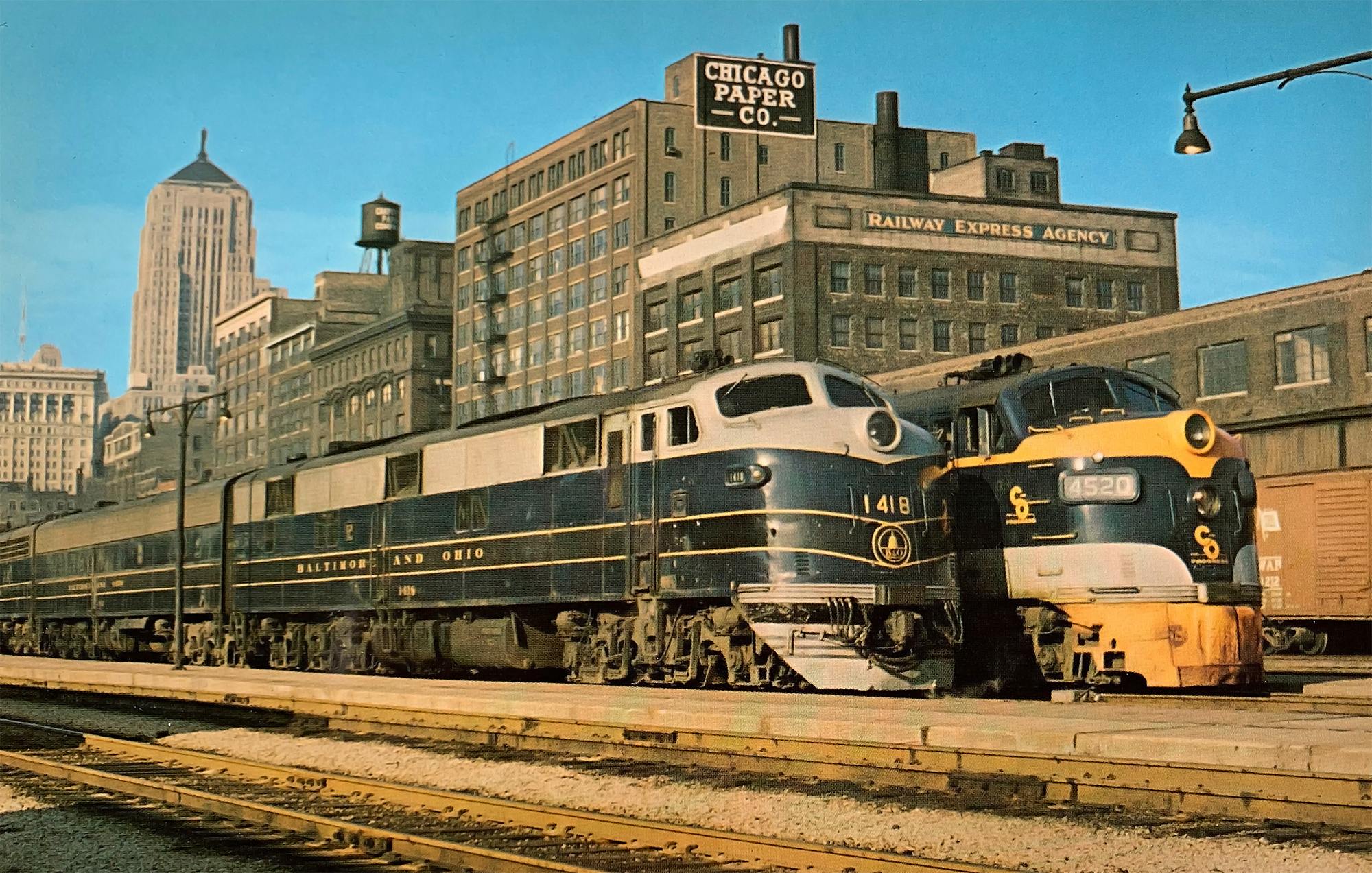 In this Baltimore & Ohio publicity photo, circa 1962, the eastbound "Capitol Limited" awaits departure from Chicago's Grand Central Station while sitting alongside a Chesapeake & Ohio "Pere Marquette." American-Rails.com collection.
In this Baltimore & Ohio publicity photo, circa 1962, the eastbound "Capitol Limited" awaits departure from Chicago's Grand Central Station while sitting alongside a Chesapeake & Ohio "Pere Marquette." American-Rails.com collection.The Baltimore & Ohio’s inability to effectively compete against the New York Central and Pennsylvania railroads in the hotly contested New York-Chicago market was threefold; a longer route, indirect access to downtown Manhattan, and prolonged financial struggles.
Not only was the B&O unable to access New York City directly (indirect entry occurred via the Central Railroad of New Jersey's Jersey City Terminal using ferry service across the Hudson River) but also its route to the Midwest was filled with stiff grades over the Alleghenies.
Drumhead
By comparison, the NYC and PRR both operated relatively level main lines across Pennsylvania/New York, Ohio, and Indiana. To compensate for these disadvantages the B&O provided personal, courtesy service and exquisite dining for which it became legendary.
Many of these amenities included secretaries, barbers, manicures, and valets, and fine Chesapeake Bay cuisine offered on exquisite dinnerware with colonial-style furniture.
At A Glance
20 Hours, 45 Minutes (Westbound) 20 Hours, 40 Minutes (Eastbound) |
|
May 12, 1923 - April 30, 1971 (Baltimore & Ohio) May 1, 1971 - Present (Amtrak) |
|
5 (Westbound) 6 (Eastbound) | |
Grand Central Station (Chicago) Communipaw Terminal (Jersey City, New Jersey) |
For the first three years of its existence the Capitol Limited was somewhat successful in the New York market as the B&O was under contract with the PRR to terminate its trains directly into the city at Pennsylvania Station.
However, this changed in the late summer of 1926 when the PRR ended the contract and the B&O was once again forced back into Jersey City (despite this the railroad made the ferry service as pleasant as possible, promoting friendly and prompt bus service into Manhattan, a move that for a time was actually quite successful).
In 1938 the Capitol Limited got a big boost when the B&O equipped the train with the Electo-Motive Corporation’s brand new, self-contained and streamlined diesel-electric locomotive, the EA.
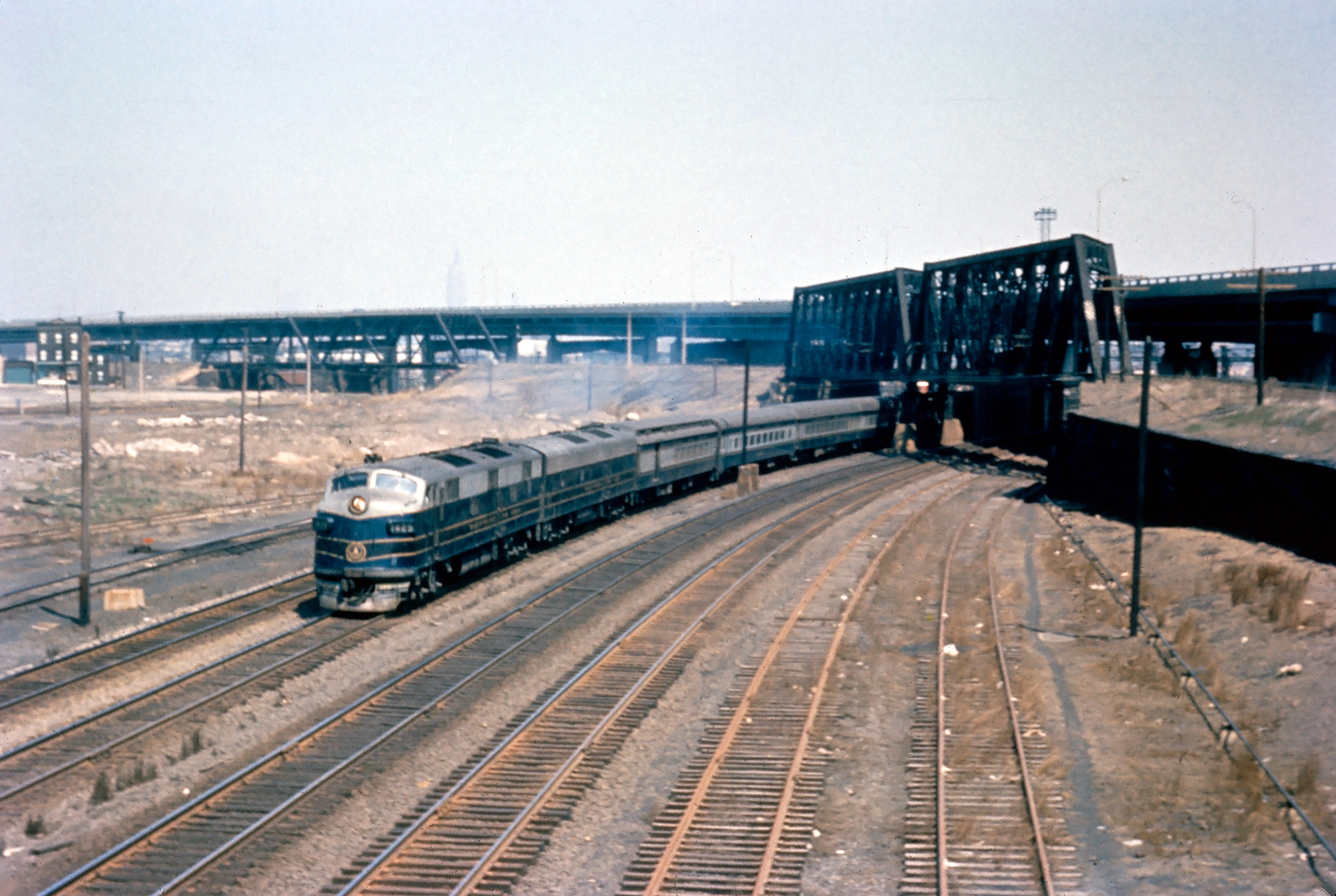 Running over the Jersey Central, Baltimore & Ohio's westbound "Capitol Limited" has just departed Communipaw Terminal in Jersey City, New Jersey, circa 1956. Up front is pair of E7's, led by #1425. Meyer Pearlman photo. American-Rails.com collection.
Running over the Jersey Central, Baltimore & Ohio's westbound "Capitol Limited" has just departed Communipaw Terminal in Jersey City, New Jersey, circa 1956. Up front is pair of E7's, led by #1425. Meyer Pearlman photo. American-Rails.com collection.Not only was the diesel streamlined but the ever-resourceful B&O, not satisfied with the light-weight, aluminum cars it had purchased for its first streamliner, the Royal Blue, turned to its Mount Clare Shops in Baltimore.
The forces there used traditional heavyweight equipment and gave the cars streamlining to match the EA/EB set. What resulted, with the help of renowned industrial designer Otto Kuhler was a stunning train with one of the all-time classic liveries; royal blue, silver, and gold pin-striping.
Route Map (B&O)
While the B&O won over the hearts of many with its splendid services and on board offerings (later amenities included air-conditioning and strata-dome car service, giving passengers a 360-degree view of the surrounding landscape) it simply could not compete with the PRR and NYC to New York.
Route Map (Amtrak)
As a result on April 26, 1958 the B&O gave up all service to New York and began terminating its trains only as far east as Baltimore.
However, unlike many other railroads the B&O did not let its passenger service slide away, and die a slow death. Right until the end the railroad offered premier service on the Cap and the train’s last journey under the B&O banner was fit for kings.
Consist (1952)
For the next thirteen years the B&O continued running its premier flagship train between Washington, D.C./Baltimore. As ridership declined the railroad began merging other trains into the Cap such as the Ambassador, which operated to Detroit, and the all-coach Columbian to Chicago.
Consist (1948)
During its last years of service the Capitol Limited continued to provide coach service with reclining seats, lounge service, Chessie tavern service, and finally Chessie Starlight Sleeper service (a rarity in the years directly before Amtrak).
Timetable (1952)
On April 29, 1971, two days before Amtrak took over most intercity passenger operations around the country, the Cap pulled out of Baltimore’s Camden Station replete with coaches, diners, lounges, strata-dome, and all for its final trip to Chicago.
Timetable (May, 1941)
| Time/Leave (Train #5) | Milepost | Location | Time/Arrive (Train #6) |
|---|---|---|---|
| 12:45 PM | 0.0 | 1:30 PM | |
| 12:58 PM | 1.0 | 1:17 PM | |
| 1:14 PM | 12.5 | 1:01 PM | |
| 1:28 PM | 24.0 | 12:47 PM | |
| 2:27 PM | 84.1 | 11:49 AM | |
| 2:42 PM (Ar) 2:43 (Dp) | 91.9 | 11:33 AM (Dp) 11:31 AM (Ar) | |
| 2:59 PM | 103.8 | ||
| 3:14 PM | 116.9 | 11:01 AM | |
| 3:29 PM | 129.1 | ||
| 4:33 PM | 186.3 | 9:48 AM | |
| 4:38 PM (Ar) 4:40 PM (Dp) | 187.8 | 9:42 AM (Dp) 9:40 AM (Ar) | |
| 5:25 PM (Ar) 5:45 PM (Dp) | 224.6 | 9:00 AM (Dp) 8:40 AM (Ar) | |
| 5:59 PM | 231.5 | 8:22 AM | |
| 7:16 PM | 298.0 | 7:04 AM | |
| 8:49 PM | 375.7 | 5:35 AM (Dp) 5:30 AM (Ar) | |
| 11:09 PM | 467.9 | ||
| 511.0 | 2:22 AM | ||
| 12:25 AM (Ar) 12:35 (Dp) | 525.8 | 1:56 AM (Dp) 1:54 AM (Ar) | |
| 591.3 | 12:26 AM | ||
| 644.5 | 11:29 PM | ||
| 719.0 | 10:07 PM (Dp) 10:02 PM (Ar) | ||
| 743.2 | 9:33 PM | ||
| 755.7 | 9:17 PM | ||
| 6:33 AM | 846.9 | 7:46 PM | |
| 5:35 AM | 846.9 | 6:44 PM | |
| 908.7 | 5:42 PM | ||
| 7:28 AM | 963.9 | 4:49 PM | |
| 7:43 AM | 978.0 | 4:31 PM | |
| 8:05 AM | 987.7 | 4:13 PM | |
| 8:30 AM | 997.2 | 3:50 PM |
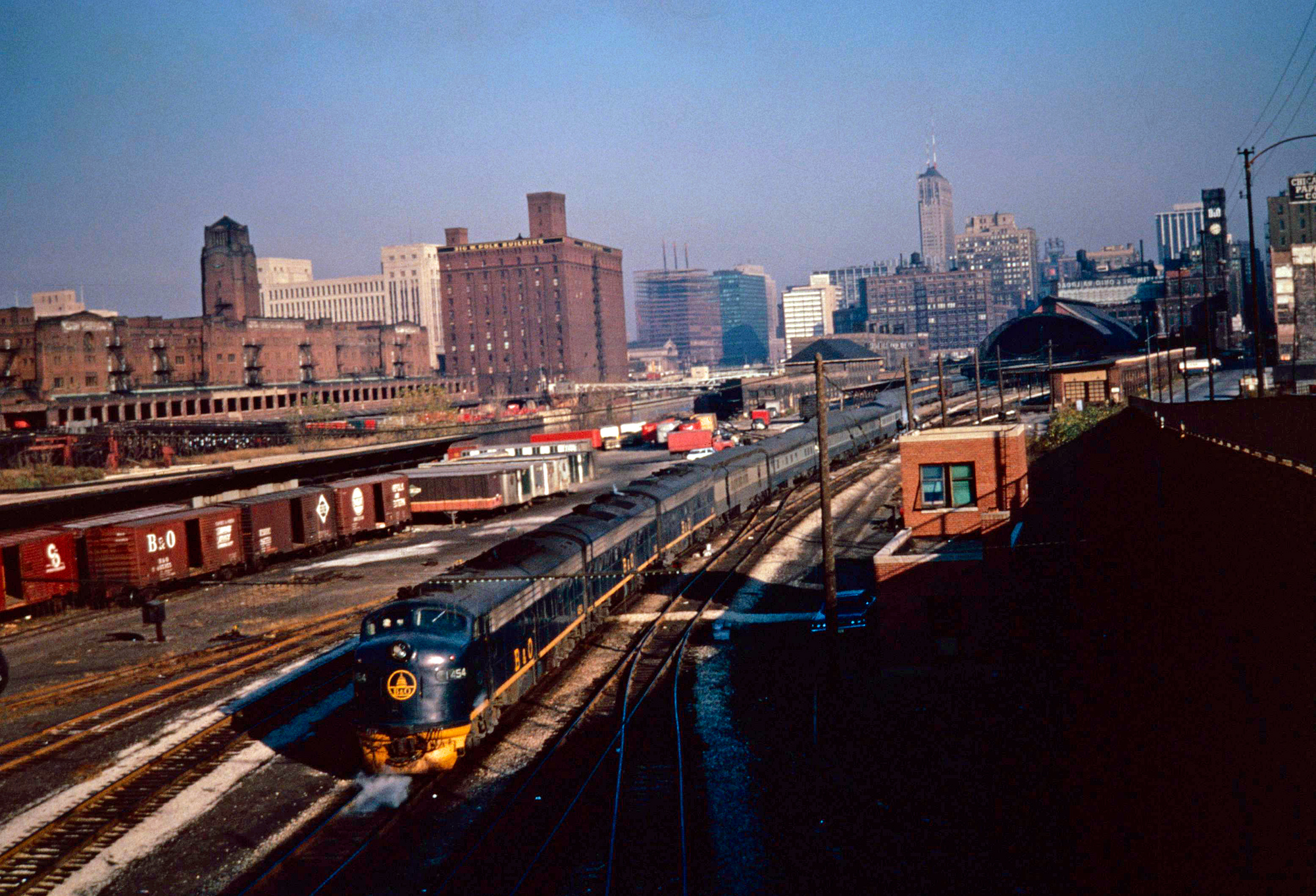 Baltimore & Ohio E9A #1454 (built as #34) leads train #5, the eastbound "Capitol Limited," out of Chicago's Grand Central Station on a fall morning in the late 1960s. American-Rails.com collection.
Baltimore & Ohio E9A #1454 (built as #34) leads train #5, the eastbound "Capitol Limited," out of Chicago's Grand Central Station on a fall morning in the late 1960s. American-Rails.com collection.The railroad even brought back its famed Deer Park spring water and all onboard vegetables were fresh, not frozen or canned. After Amtrak took over it initially canceled all B&O trains, including the Cap.
However, ten years after making its final run under its original creator, Amtrak brought back the train in 1981, operating it over its original route between Washington, D.C. and Chicago where it continues to remain in service today.
Amtrak
Amtrak's Capitol Limited still connects Washington D.C. and Chicago. The route boasts several significant stops, serving as a vital link within the United States railway network. Notable stops include Harpers Ferry in West Virginia, Pittsburgh in Pennsylvania, Cleveland in Ohio, and South Bend in Indiana, among others.
This noteworthy train is recognized by the numbers 29 and 30 on the timetable. Train 29 travels westward from Washington D.C. to Chicago, and the reverse, eastward trip, is carried by train 30.
Amtrak provides a range of on-board services to make the journey on the Capitol Limited as comfortable as possible. These include reclining coach seats, private rooms, a dining car and a café, free WiFi, and even checked baggage service at select stations.
The exact travel time varies due to differing factors, but generally spans around 17 hours and 25 minutes, offering ample time for passengers to unwind, relax, and soak up the countryside's scenic beauty.
The train's route stretches an impressive length of approximately 764 miles across several states, truly embodying the spectrum of American landscapes and cityscapes.
The Capitol Limited's termi offer numerous connecting Amtrak train services. In Washington D.C., the Silver Meteor and Cardinal connect passengers to the south and southeastern U.S., while in Chicago, the Southwest Chief and Empire Builder offer connectivity to the western U.S.
Several Amtrak partner bus services further diversify the reach of the Capitol Limited, providing passengers with an extended web of travel opportunities.
Traveling on this train reveals a panorama of the American heartland, offering passengers a myriad of diverse landscapes. Historic cities, industrial towns, stretches of Appalachian Mountains, and the serene Potomac River are among the many scenic highlights noted by many passengers.
From the historical sites within the charismatic cities of Washington D.C. and Chicago to the quaint charm of Harpers Ferry or the deep riverside woods of Cumberland, the sights available on this route provide a unique cross-continental picture.
The Capitol Limited not only serves as a crucial transportation artery but also tells an extraordinary tale of the expansion and interconnection of America's east and midwest regions.
The train has upheld its legacy of offering reliable and comfortable transportation while presenting a broad taste of America's heartland to its passengers.
Tracing back to 1923, the service, formerly the B&O's (Baltimore and Ohio) Capitol Limited, connected the same two cities and shared a similar route with today's version.
Historically, the train played an essential role in supporting the nation's growth and development, serving communities and contributing to economic activity in the areas it connects.
Today, its cars feature long-haul amenities, such as superliner sleeping cars, bi-level Superliner coaches, Sightseer lounge cars, and more. Riding aboard is a journey of convenience, historical exploration, and scenic appreciation.
Amtrak remains committed to upholding the historic legacy of the Capitol Limited while constantly innovating towards a more environmentally friendly, efficient, and passenger-centric future.
Planning a journey on this route also allows one to explore numerous on-route attractions, such as the John F. Kennedy Center in Washington D.C., Navy Pier in Chicago, Harpers Ferry National Historical Park, and the Carnegie Museum of Natural History in Pittsburgh.
Whether one is a seasoned railway enthusiast, historian, or casual traveler seeking an efficient and exciting transportation choice, the Capitol Limited offers an unparalleled experience.
Ultimately, it is more than just a train ride – it's a journey through the heart of America, connecting individuals, landscapes, and histories, and continuing to drive the nation's growth and development.
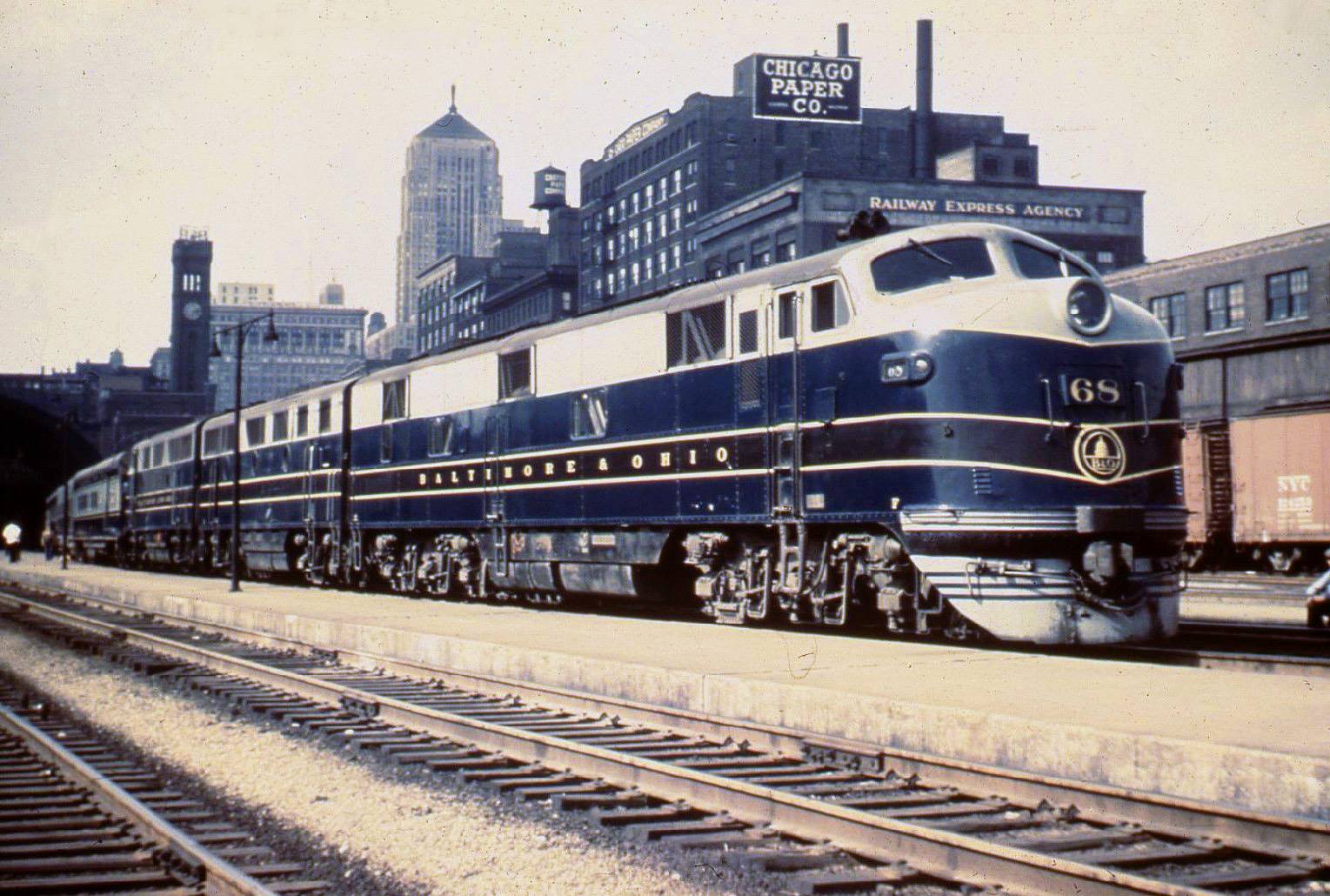 Baltimore & Ohio E7A #68 and what appears to be a trailing B-A set of F3's have what is likely the "Capitol Limited" (New York - Chicago) at Chicago's Grand Central Station during May of 1953.
Baltimore & Ohio E7A #68 and what appears to be a trailing B-A set of F3's have what is likely the "Capitol Limited" (New York - Chicago) at Chicago's Grand Central Station during May of 1953.Sources
- Reynolds, Kirk and Oroszi, David. Baltimore & Ohio Railroad. Osceola: MBI Publishing, 2000.
- Schafer, Mike. Classic American Railroads. Osceola: MBI Publishing, 1996.
- Schafer, Mike and Welsh, Joe. Streamliners, History of a Railroad Icon. St. Paul: MBI Publishing, 2003.
- Welsh, Joe. Baltimore & Ohio's Capitol Limited And National Limited. St. Paul: MBI Publishing, 2007.
Recent Articles
-
New York Easter Train Rides
Feb 12, 26 01:19 PM
New York is home to several Easter-themed train rides including the Adirondack Railroad, Catskill Mountain Railroad, and a few others! -
Missouri Easter Train Rides
Feb 12, 26 01:13 PM
The beautiful state of Missouri is home to a handful of heritage railroads although only one provides an Easter-themed train ride. Learn more about this event here. -
Arizona's Wild West Train Rides
Feb 12, 26 01:05 PM
Let's delve into the captivating world of Arizona's Wild West train adventures, currently offered at the popular Grand Canyon Railway. -
Missouri's Wild West Train Rides
Feb 12, 26 12:49 PM
In Missouri, a state rich in history and natural beauty, you can experience the thrill of a bygone era through the scenic and immersive Wild West train rides. -
Maine's Tea Tasting Train Rides
Feb 12, 26 12:42 PM
Tea trains aboard the historic WW&F Railway Museum promises to transport you not just through the picturesque landscapes of Maine, but also back to a simpler time. -
Pennsylvania Tea Tasting Train Rides
Feb 12, 26 12:09 PM
In this article, we explore some of the most enchanting tea train rides in Pennsylvania, currently offered at the historic Strasburg Rail Road. -
Nevada St. Patrick's Day Train Rides
Feb 12, 26 11:39 AM
Today, restored segments of the “Queen of the Short Lines” host scenic excursions and special events that blend living history with pure entertainment—none more delightfully suspenseful than the Emera… -
Minnesota Ice Cream Tasting Train Rides
Feb 12, 26 10:22 AM
Among MTM’s most family-friendly excursions is a summertime classic: the Dresser Ice Cream Train (often listed as the Osceola/Dresser Ice Cream Train). -
Wisconsin's Wild West Train Rides
Feb 11, 26 10:54 PM
Through a unique blend of interactive entertainment and historical reverence, Wisconsin offers a captivating glimpse into the past with its Wild West train rides. -
Georgia's Wild West Train Rides
Feb 11, 26 10:44 PM
Nestled within its lush hills and historic towns, the Peach State offers unforgettable train rides that channel the spirit of the Wild West. -
North Carolina's Wild West Train Rides
Feb 11, 26 02:36 PM
North Carolina, a state known for its diverse landscapes ranging from serene beaches to majestic mountains, offers a unique blend of history and adventure through its Wild West train rides. -
South Carolina's Dinner Train Rides
Feb 11, 26 02:16 PM
There is only location in the Palmetto State offering a true dinner train experience can be found at the South Carolina Railroad Museum. Learn more here. -
Rhode Island's Dinner Train Rides
Feb 11, 26 02:08 PM
Despite its small size, Rhode Island is home to one popular dinner train experience where guests can enjoy the breathtaking views of Aquidneck Island. -
New York Tea Tasting Train Rides
Feb 11, 26 01:56 PM
Tea train rides provide not only a picturesque journey through some of New York's most scenic landscapes but also present travelers with a delightful opportunity to indulge in an assortment of teas. -
California Tea Tasting Train Rides
Feb 11, 26 01:37 PM
In California you can enjoy a quiet tea train experience aboard the Napa Valley Wine Train, which offers an afternoon tea service. -
Tennessee Tea Tasting Train Rides
Feb 11, 26 01:19 PM
If you’re looking for a Chattanooga outing that feels equal parts special occasion and time-travel, the Tennessee Valley Railroad Museum (TVRM) has a surprisingly elegant answer: The Homefront Tea Roo… -
Maine Ice Cream Tasting Train Rides
Feb 11, 26 11:58 AM
The Maine Narrow Gauge Railroad & Museum’s Ice Cream Train is a family-friendly Friday-night tradition that turns a short rail excursion into a small event. -
North Carolina Ice Cream Tasting Train Rides
Feb 11, 26 11:06 AM
One of the most popular warm-weather offerings at NCTM is the Ice Cream Train, a simple but brilliant concept: pair a relaxing ride with a classic summer treat. -
Pennsylvania "Wild West" Train Rides
Feb 10, 26 12:04 PM
The Keystone State is home to a variety of historical attractions, but few experiences can rival the excitement and nostalgia of a Wild West train ride. -
Ohio "Wild West" Train Rides
Feb 10, 26 11:34 AM
For those enamored with tales of the Old West, Ohio's railroad experiences offer a unique blend of history, adventure, and natural beauty. -
New York "Wild West" Train Rides
Feb 10, 26 11:23 AM
Join us as we explore wild west train rides in New York, bringing history to life and offering a memorable escape to another era. -
New Mexico Murder Mystery Train Rides
Feb 10, 26 11:12 AM
Among Sky Railway's most theatrical offerings is “A Murder Mystery,” a 2–2.5 hour immersive production that drops passengers into a stylized whodunit on the rails -
New York Ice Cream Tasting Train Rides
Feb 10, 26 10:09 AM
While CMRR runs several seasonal excursions, one of the most family-friendly (and, frankly, joyfully simple) offerings is its Ice Cream Express. -
Michigan Beer Tasting Train Rides
Feb 10, 26 10:02 AM
If you’re looking for a pure slice of autumn in West Michigan, the Coopersville & Marne Railway (C&M) has a themed excursion that fits the season perfectly: the Oktoberfest Express Train. -
Ohio Beer Tasting Train Rides
Feb 09, 26 10:07 PM
The Ohio Rail Experience's Quincy Sunset Tasting Train is a new offering that pairs an easygoing evening schedule with a signature scenic highlight: a high, dramatic crossing of the Quincy Bridge over… -
Texas Beer Tasting Train Rides
Feb 09, 26 02:07 PM
Texas State Railroad's “Pints In The Pines” train is one of the most enjoyable ways to experience the line: a vintage evening departure, craft beer samplings, and a catered dinner at the Rusk depot un… -
Michigan's ~ Murder Mystery ~ Dinner Train Rides
Feb 09, 26 01:47 PM
Among the lesser-known treasures of this state are the intriguing murder mystery dinner train rides—a perfect blend of suspense, dining, and scenic exploration. -
Virginia ~ Murder Mystery ~ Dinner Train Rides
Feb 09, 26 01:39 PM
Among the state's railroad attractions, murder mystery dinner trains stand out as a captivating fusion of theatrical entertainment, fine dining, and scenic travel. -
Florida Beer Tasting Train Rides
Feb 09, 26 01:25 PM
Among the Sugar Express's most popular “kick off the weekend” events is Sunset & Suds—an adults-focused, late-afternoon ride that blends countryside scenery with an onboard bar and a laid-back social… -
Illinois Beer Tasting Train Rides
Feb 09, 26 12:04 PM
Among IRM’s newer special events, Hops Aboard is designed for adults who want the museum’s moving-train atmosphere paired with a curated craft beer experience. -
Tennessee Whiskey Tasting Train Rides
Feb 08, 26 10:46 AM
Here’s what to know, who to watch, and how to plan an unforgettable rail-and-whiskey experience in the Volunteer State. -
Wisconsin Beer Tasting Train Rides
Feb 08, 26 10:35 AM
The East Troy Railroad Museum's Beer Tasting Train, a 2½-hour evening ride designed to blend scenic travel with guided sampling. -
California Beer Tasting Train Rides
Feb 08, 26 10:33 AM
While the Niles Canyon Railway is known for family-friendly weekend excursions and seasonal classics, one of its most popular grown-up offerings is Beer on the Rails. -
Colorado BBQ Tasting Train Rides
Feb 08, 26 10:32 AM
One of the most popular ways to ride the Leadville Railroad is during a special event—especially the Devil’s Tail BBQ Special, an evening dinner train that pairs golden-hour mountain vistas with a hea… -
New Jersey Beer Tasting Train Rides
Feb 07, 26 11:23 AM
On select dates, the Woodstown Central Railroad pairs its scenery with one of South Jersey’s most enjoyable grown-up itineraries: the Brew to Brew Train. -
Minnesota Beer Tasting Train Rides
Feb 07, 26 11:21 AM
Among the North Shore Scenic Railroad's special events, one consistently rises to the top for adults looking for a lively night out: the Beer Tasting Train, -
New Mexico Beer Tasting Train Rides
Feb 07, 26 11:18 AM
Sky Railway's New Mexico Ale Trail Train is the headliner: a 21+ excursion that pairs local brewery pours with a relaxed ride on the historic Santa Fe–Lamy line. -
Michigan Whiskey Tasting Train Rides
Feb 07, 26 11:13 AM
There's a unique thrill in combining the romance of train travel with the rich, warming flavors of expertly crafted whiskeys. -
Oregon Beer Tasting Train Rides
Feb 07, 26 10:08 AM
If your idea of a perfect night out involves craft beer, scenery, and the gentle rhythm of jointed rail, Santiam Excursion Trains delivers a refreshingly different kind of “brew tour.” -
Arizona Beer Tasting Train Rides
Feb 07, 26 09:22 AM
Verde Canyon Railroad’s signature fall celebration—Ales On Rails—adds an Oktoberfest-style craft beer festival at the depot before you ever step aboard. -
Pennsylvania Ice Cream Tasting Train Rides
Feb 06, 26 05:19 PM
And among Everett’s most family-friendly offerings, none is more simple-and-satisfying than the Ice Cream Special—a two-hour, round-trip ride with a mid-journey stop for a cold treat in the charming t… -
New York Beer Tasting Train Rides
Feb 06, 26 12:12 PM
Among the Adirondack Railroad's most popular special outings is the Beer & Wine Train Series, an adult-oriented excursion built around the simple pleasures of rail travel. -
Massachusetts Beer Tasting Train Rides
Feb 06, 26 12:09 PM
Among Cape Cod Central's lineup of specialty trips, the railroad’s Rails & Ales Beer Tasting Train stands out as a “best of both worlds” event. -
Pennsylvania Beer Tasting Train Rides
Feb 06, 26 12:02 PM
Today, EBT’s rebirth has introduced a growing lineup of experiences, and one of the most enticing for adult visitors is the Broad Top Brews Train. -
New York Whiskey Tasting Train Rides
Feb 06, 26 11:56 AM
For those keen on embarking on such an adventure, the Arcade & Attica offers a unique whiskey tasting train at the end of each summer! -
Florida Whiskey Tasting Train Rides
Feb 06, 26 11:51 AM
If you’re dreaming of a whiskey-forward journey by rail in the Sunshine State, here’s what’s available now, what to watch for next, and how to craft a memorable experience of your own. -
Kentucky Whiskey Tasting Train Rides
Feb 06, 26 11:49 AM
Whether you’re a curious sipper planning your first bourbon getaway or a seasoned enthusiast seeking a fresh angle on the Kentucky Bourbon Trail, a train excursion offers a slow, scenic, and flavor-fo… -
Indiana Ice Cream Tasting Train Rides
Feb 06, 26 10:18 AM
The Indiana Rail Experience's "Indiana Ice Cream Train" is designed for everyone—families with young kids, casual visitors in town for the lake, and even adults who just want an hour away from screens… -
Maryland Ice Cream Tasting Train Rides
Feb 05, 26 10:07 PM
Among WMSR's shorter outings, one event punches well above its “simple fun” weight class: the Ice Cream Train. -
North Carolina Beer Tasting Train Rides
Feb 05, 26 01:28 PM
If you’re looking for the most “Bryson City” way to combine railroading and local flavor, the Smoky Mountain Beer Run is the one to circle on the calendar.

